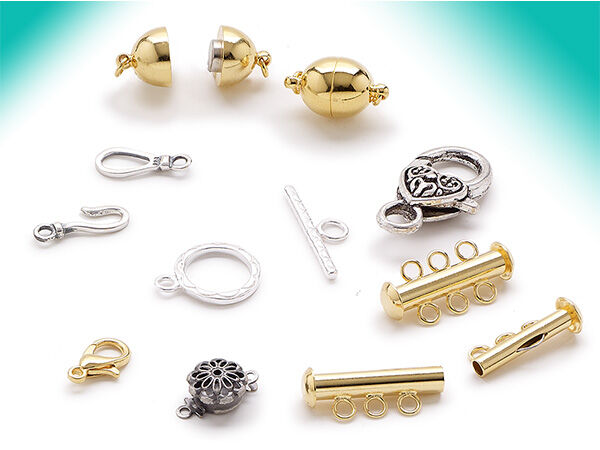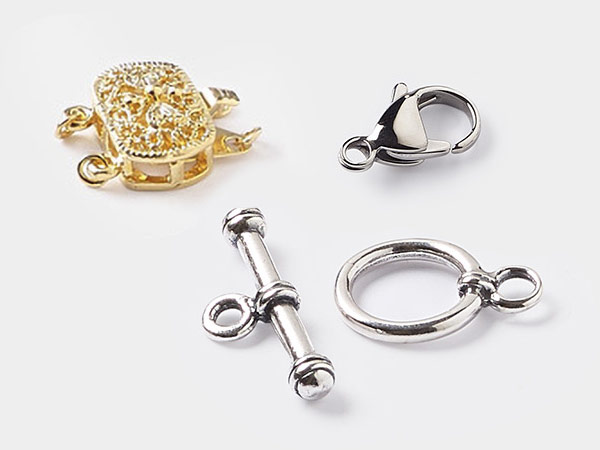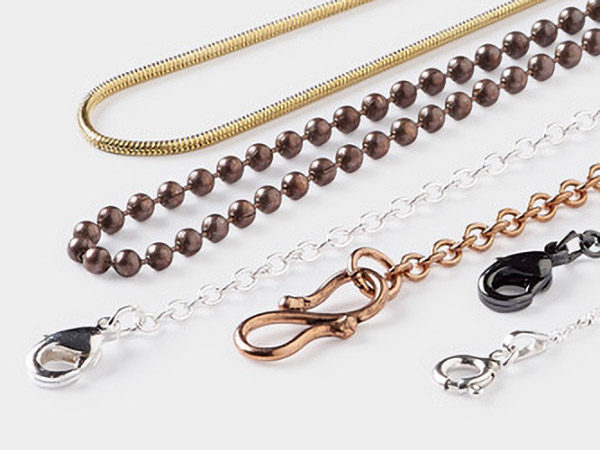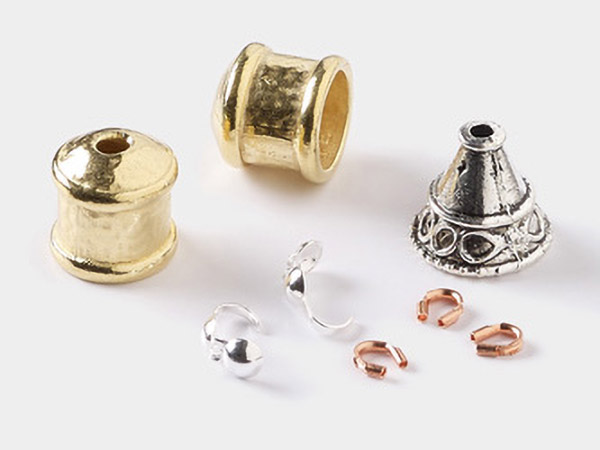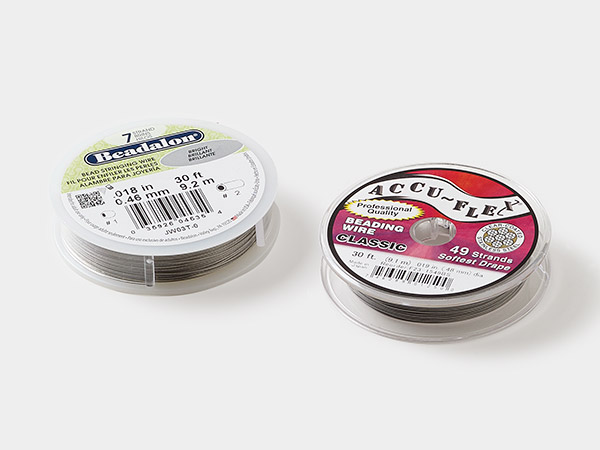All About Clasps: A Clasp Style Guide and Easy Reference Chart
Clasps are a true workhorse. They do much more than just keep a piece of jewelry closed--they are key to jewelry functionality and aesthetics. Find the right style with the following clasp guide.

Are you unsure about what kind of clasp to use in your next jewelry project? Learn all about the different types of clasps with jewelry designer Patti and discover the kinds of designs that each style is best suited for.
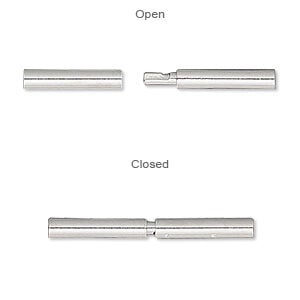
Add-a-bead clasps (aka tube-lock clasps) are designed for use with chain, wire and cord. The slim profile of the tube clasp allows large hole beads or large loop bails to slide right over the clasp onto the necklace, while a simple push-and-twist design allows for easy on and off. Apply durable glue, such as Loctite® 409 Gel, to the inside of the tube, slide onto your wire or thin cord and allow to dry. Works best with lightweight designs.
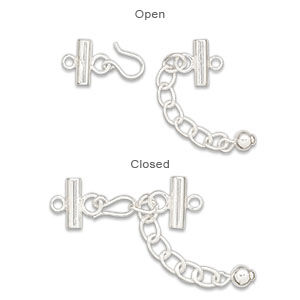
Adjustable clasps are clasps with an attached length of chain. This allows a designer to vary necklace length for sizing versatility. Personalize by adding a bead or component to the end of the chain.
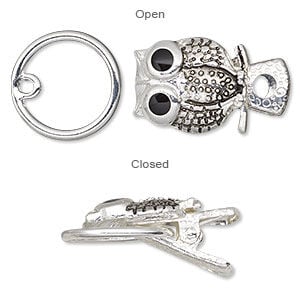
Alligator clasps can be used as a traditional clasp or as a clip for accessories. Many styles of this clasp feature a large loop suitable for multi-strand designs, large cord or leather.
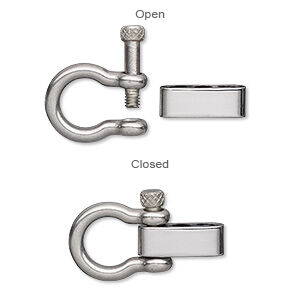
Anchor shackle clasps (aka U shackle clasps) are clasps popularly used with necklaces or bracelets made of parachute cord or leather. The design is spare, making it a perfect choice for utilitarian jewelry designs.
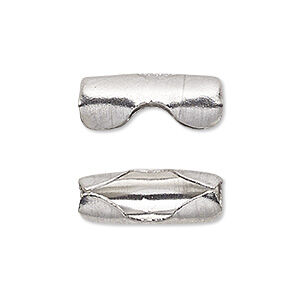
Ball chain connectors are used as clasps for ball chain, which is mostly used in key chains, neck chains and bracelets.
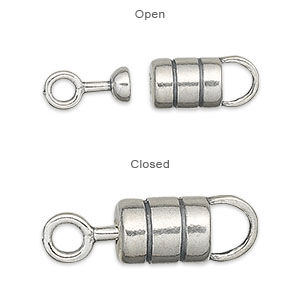
Ball-and-Joint Clasps use pressure on the ball to keep the clasps closed. Due to their easy-open and easy-close design, these styles are best for lightweight to medium-weight necklace designs.
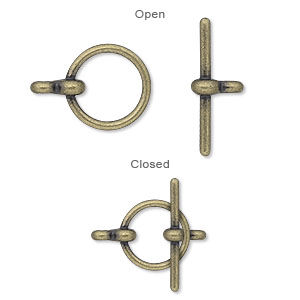
Bar-and-ring toggle clasps are two-piece clasps. One piece is formed into a loop; the other piece is a ''T'' shaped bar. The clasp is closed by pulling the ''T'' shaped bar through the open loop. Easy to use, the toggle clasp is available in a wide variety of styles and materials. Commonly used for necklaces (including lariat style), bracelets and anklets.
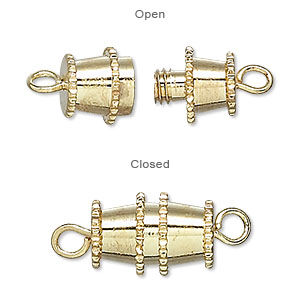
Barrel clasps or torpedo clasps are threaded clasps, which twist to open and close. These clasps provide a clean line to jewelry designs.
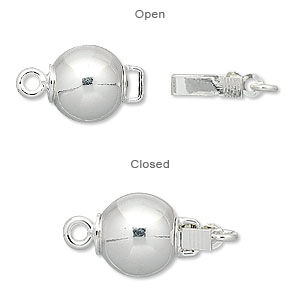
Bead clasps look like a bead and come with a magnet, tab or bayonet closure. They blend in when closed, allowing the design to flow uninterrupted.
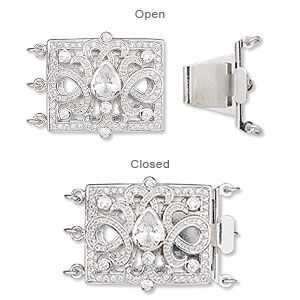
Box (aka tab insert) clasps have a tab that is inserted into a decorative frame or box. Some styles come with safety latches or safety chains in the event the tab comes out of the clasp. They are best used for lightweight necklaces, bracelets and anklets.
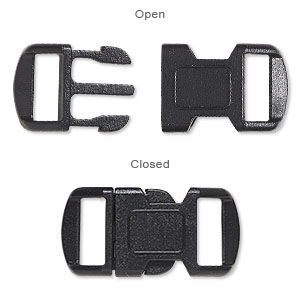
Buckle clasps are two-piece clasps that have openings on both ends to accommodate various types of cord and leather for a secure finish.
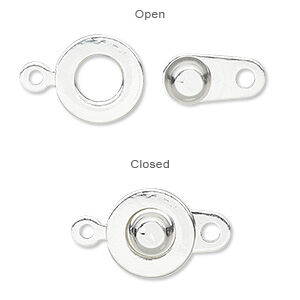
Button clasps have a small button that snaps into a loop. They work well as a link or for attaching interchangeable pendants, drops or charms.
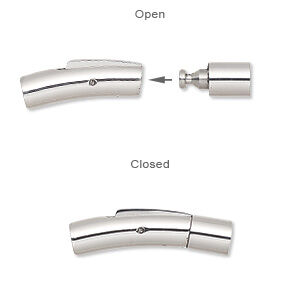
Bullet clasps open with one touch and are closed by pushing both ends together. Extremely secure and long-lasting for bracelet and necklace designs.
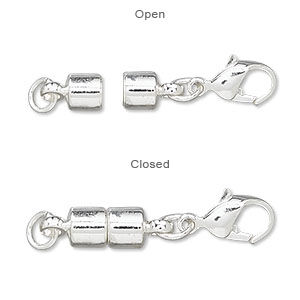
Clasp converters quickly and easily modify most finished necklaces into magnetic clasp necklaces, making them easier to use for people who have difficulty opening and closing conventional clasps.
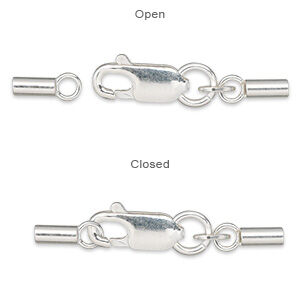
Crimping clasps are crimped onto the end of beading wire or cord with crimping or flat-nose pliers. Can include hook-and-eye, lobster claw and magnetic clasp styles.
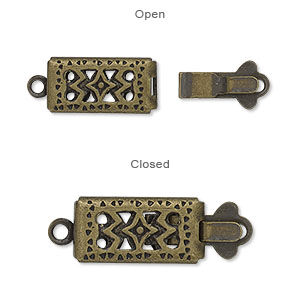
Filigree clasps are small clasps with a fishhook-shaped hook which is inserted into a box. The hook has notches to help secure jewelry. Ideal for lightweight necklaces and bracelets.
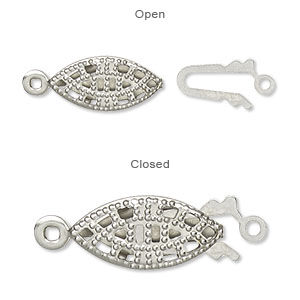
Fishhook clasps are small clasps with a fishhook-shaped hook which is inserted into a box. The hook has notches to help secure jewelry. Ideal for lightweight necklaces and bracelets.
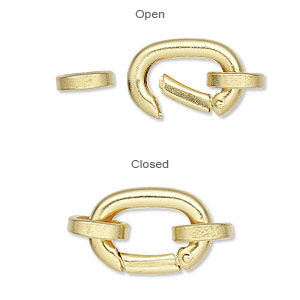
Hinged clip (aka self-closing hook) clasps are self-closing hinged clasps that feature spring mechanisms made of steel for added strength. These clasps also work well as links in designs or when used to attach interchangeable pendants, drops or charms.
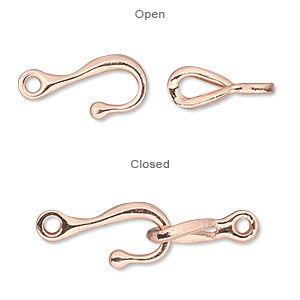
Hook-and-eye (aka hook-style) clasps come in a wide selection of patterns, designs and styles. This easy-open clasp is recommended for necklaces and chain belts.
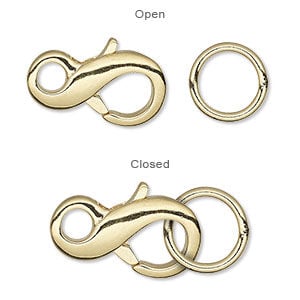
Lobster claw clasps are self-closing, spring-loaded clasps available in a range of shapes, sizes and styles. Suitable mostly for lightweight to medium-weight designs, some larger styles can accommodate larger and heavier pieces.
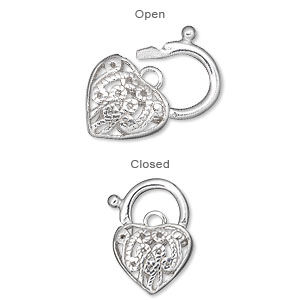
Lock (aka tab) clasps can connect cord or chain. They work well as a focal or drop as well.
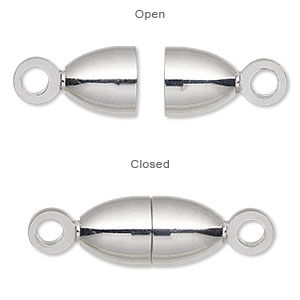
Magnetic clasps are clasps that are secured using magnets. To open a barrel-style magnetic clasp, slide the two ends apart rather than pulling to prevent pulling the magnets out of the clasp.
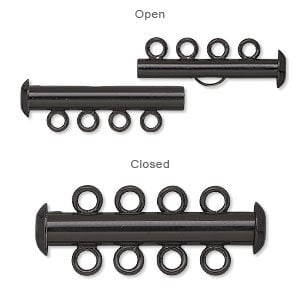
Multi-strand clasps have two or more loops on each side for jewelry design with more than one strand. Comes in a variety of closure styles such as box style, hook and eye, slide lock and toggle clasps.
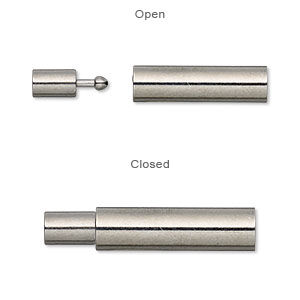
Pop-style clasps have a strong hold and are easy to pull apart. They have a streamlined look which helps them to blend seamlessly.
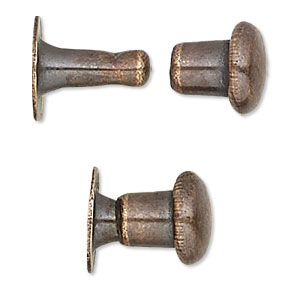
Rivet button clasps have a threaded flat back that let jewelry makers effortlessly create cold connections without soldering. These twist-in flat round rivets are ideal for embellishing leather and metal jewelry designs or other projects including bracelets, necklaces, belts, purses and more.
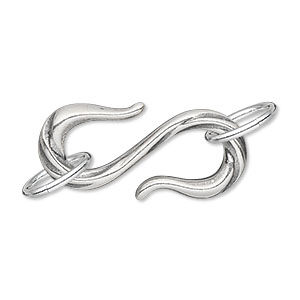
S-hook clasps are double-ended clasps, shaped like an ''S.'' Available in a spectrum of sizes and styles; some clasps are sold with two rings. Pinching the arm of the ''S'' secures the clasp. Gently pulling the ''S'' open again releases the ring and opens the clasp.
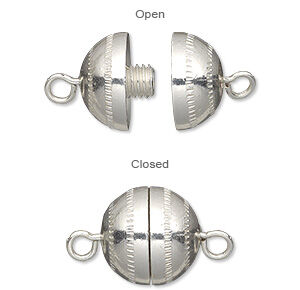
Screw clasps have a threaded screw closure, similar to a barrel clasp.
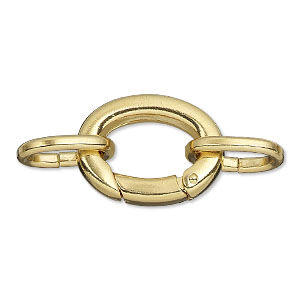
Self-closing hook clasps are hinged clasps featuring spring mechanisms made of steel for added strength. These clasps work well as links or when used to attach interchangeable pendants, drops or charms.
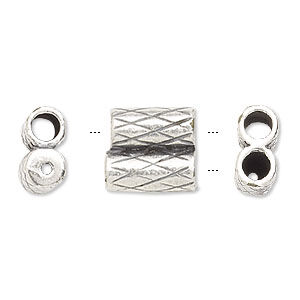
Slide tube clasps attach to both ends of single-strand cord jewelry to make it adjustable. Pass one end of the cord through the open side and glue into the end cap. Repeat on the opposite side with the remaining cord end.
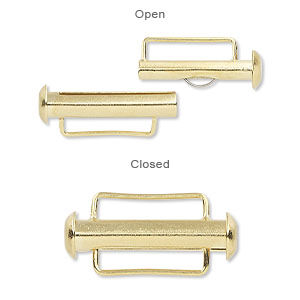
Slide lock clasps consist of a set of tubes, one of which slides inside the other and locks into place. Their sturdy tube and lock make them perfect for multi-strand designs.
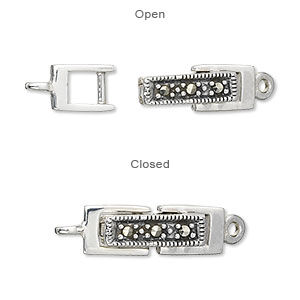
Snap lock (aka fold-over) clasps are a hinged clasp that folds shut, closing securely and locking with a quiet ''snap.'' These secure closures are ideal for bracelets or anklets.
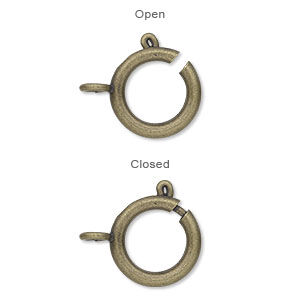
Springring clasps are a popular spring-loaded clasp often used with a jump ring or chain tab to make a complete clasp. Pull the trigger to open, release to close. Comes in a variety of sizes and styles.
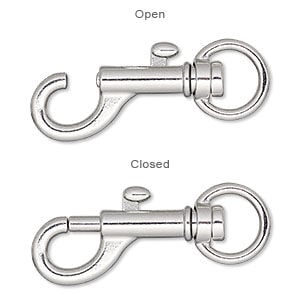
Swivel clasps are a form of the lobster claw clasp. The swivel allows the design to twist 360 degrees while the clasp stays in place. Ideal for bracelets, anklets and keychains.
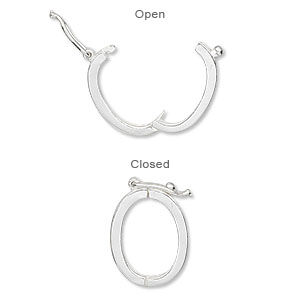
Twister clasps are hinged clasps that convert a continuous strand necklace into a twisted choker style necklace. Take any long necklace, about 36 to 42 inches long, loop on to an opened end, place the other end on your finger and twist it. Place on your neck and hook the loop on your finger to the clasp. Since a twister clasp is a simple, hinged loop, you can easily remove it to change back to the longer style. This handy converter can work with single strands or multiple strands.
Shop for Your Materials Here:
Have a question regarding this project? Email Customer Service.
Copyright Permissions
All works of authorship (articles, videos, tutorials and other creative works) are from the Fire Mountain Gems and Beads® Collection, and permission to copy is granted for non-commercial educational purposes only. All other reproduction requires written permission. For more information, please email copyrightpermission@firemtn.com.

